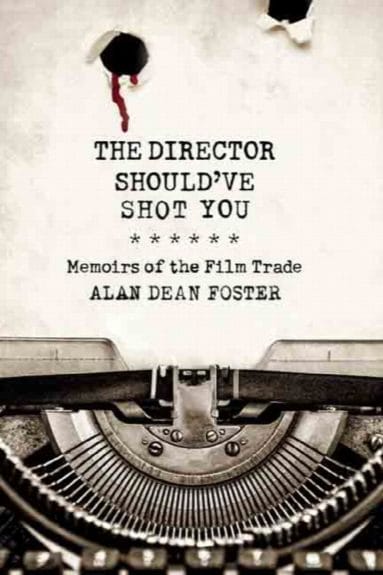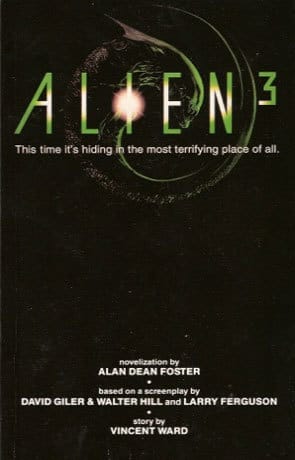Hollywood & Spine Archive: Foster Cares
A review of novelization legend Alan Dean Foster's memoir THE DIRECTOR SHOULD'VE SHOT YOU, originally published in July 2021.

I was so excited to read - and am still excited to own - this book, which is a rich primary source on what novelizations have been, are and can be. Alan Dean Foster's career is deeply impressive, and his willingness to share his insights (both here and elsewhere - he's done plenty of interviews and other media appearances) is particularly illuminative. My Foster story is this: after I wrote the Hollywod & Spine on The Thing early on, I sent it to the e-mail on his website. I got back a brief but kind response, so you can add "courteous to fans" to the list of reasons to like his work. (originally published 7/28/2021)

The Director Should've Shot You: Memoirs of the Film Trade by Alan Dean Foster (Centipede Press, 2021)
The pitch: A fascinating, bespoke memoir from one of the most notable novelization writers of all time.
The author: Alan Dean Foster has been writing fan-favorite novelizations for nearly 50 years, most famously Star Wars: From the Adventures of Luke Skywalker (a 1976 read that predated the film by six months and helped set some of the ground work for the series' well-loved lore) and prose adaptations of the first three Alien films. In 2020, he earned some justifiable notoriety for taking The Walt Disney Company to task for unpaid royalties on these books - a situation that seems to have resolved in his favor.
The lowdown: I don't think it's hyperbolic to say there's never been a book like The Director Should've Shot You in Hollywood & Spine, nor is it farfetched to suggest that this may be as exciting as it gets. Outside of Randall D. Larson's academic Films Into Books reference guide (or, since this was initially published, David Spencer's The Novelizers), there's not a lot of ink spilled on what it's like being a novelization writer. Foster may be the man most suited for the job: he's touched some of the biggest franchises around (beyond the aforementioned, he's done book adaptations of Star Trek, Terminator and Transformers features) and has managed to keep at it as the tie-in industry - and indeed, the motion picture business as a whole - has shifted around him. (His most recent adaptation was of 2017's Alien: Covenant, a franchise he returned to after some trepidation, which we'll get to.)
Like all good raconteurs (I often find this word usable for self-involved storytellers, but his storytelling is crisp enough to merit its use in kindness), Foster knows what makes a good story. I knew this ever since reading his adaptation of Star Wars (credited to George Lucas himself), which offers a tantalizing hint to the larger arc of the saga in its first pages, from the first-ever mention of Emperor Palpatine to an allusion to the Journal of the Whills, a piece of lore still being built out to this day. His details are never extraneous and always delicious.

What makes Foster such a unique figure, I think, is that he probably knows this, too. Common threads throughout the book include his love of science, an insatiable desire to make science fiction stories make more scientific sense, and - where applicable - a yen to make less palatable screen stories more sensible to fans. These values power one of his most infamous adaptations (1992's Alien 3, in which he tried valiantly to prevent Aliens' supporting characters from being killed off) and one of the book's juiciest chapters (covering a book version of The Chronicles of Riddick, where his willingness to speak his mind inspired a battle of wills between star/novelization enthusiast Vin Diesel and writer/director David Twohy). If you've not read Foster's work, you might wonder where he gets the balls; if you're a fan, you're grateful he did - and by the end of the book, you'll likely become a fan yourself.
The details: If you're wondering about any of Foster's books, you'll find them in here - each gets its own chapter. Some of the seemingly least consequential ones are the best: the story of his first novelization - of a cheap Italian exploitation film he was screened with no script and no subtitles - is a killer, as is a brief, stunning passage on an unpublished adaptation on the controversial abortion arc on the sitcom Maude. (As Foster helpfully notes, his papers have been donated to the University of Arizona-Tempe...field trip!) It's also worth noting that, as films got more franchised in the '80s, he kind of stayed off the beaten track, adapting solid cult classics like Clash of the Titans, Starman, Clint Eastwood's fantasy Western Pale Rider and even Shadowkeep, an interactive video game that spun off the first game novelization of all time. (That chapter discusses a tantalizing, unrealized attempt to collaborate on a feature project tied to Don Bluth's beloved interactive game Dragon's Lair.)

Foster's prose is lean but substantive, rarely belaboring the inner workings of each book - the assumption being you've read a handful of these along the way. He gets into the whys, wherefores and hows of adaptation better than almost anyone can - he really cares about illuminating the reader's pathways to understanding how to turn a screenplay into a piece of prose, as well as the tools he's given and how they evolve over time. (By the mid to late '00s, it's clear he's seeing some sort of rough cut of each film before writing the book, a luxury that could not be afforded in the early blockbuster age.)
The Director Should've Shot You also offers a healthy, introductory autobiography: chance encounters with small-screen bombshells like Julie Newmar and Diana Rigg, and the spate of good writing fortune that prematurely ended the pursuit of a law degree - including short-story work edited by the legendary John W. Campbell (writer of the short story Who Goes There?...later adapted by John Carpenter as The Thing novelized by Foster!). Even in those early days, the fun he clearly had in service of these novelizations - not to mention a healthy ongoing body of work of original sci-fi - is palpable.
image
If there's anything really lacking in the telling, then, it's why? Foster is humble about his craft to start - writing is something that never grabbed him until it did, and he realized he excelled at it. One might want more about the spark of what made that profession so irresistible in its pursuit. And in turn, one might wonder the true nature of his impulses to try to improve some of the thinner scripts he's taken on. He's got an MFA in cinema from UCLA, sure...but it's sometimes hard to square the two sides of his work: dutiful but immersive adaptations, and the occasional desire to make them a little less shitty, sometimes.
The last word: Those quibbles are minor, though. The Director Should've Shot You is rich in detail about a career well-lived at the intersection of art and commerce, and an essential work from a journeyman writer who deserves to take this literary bow. Highly, highly recommended.
